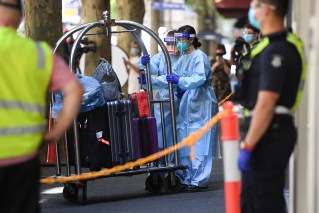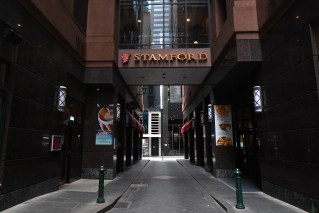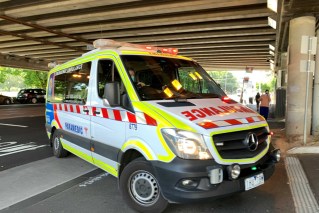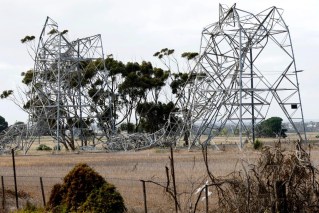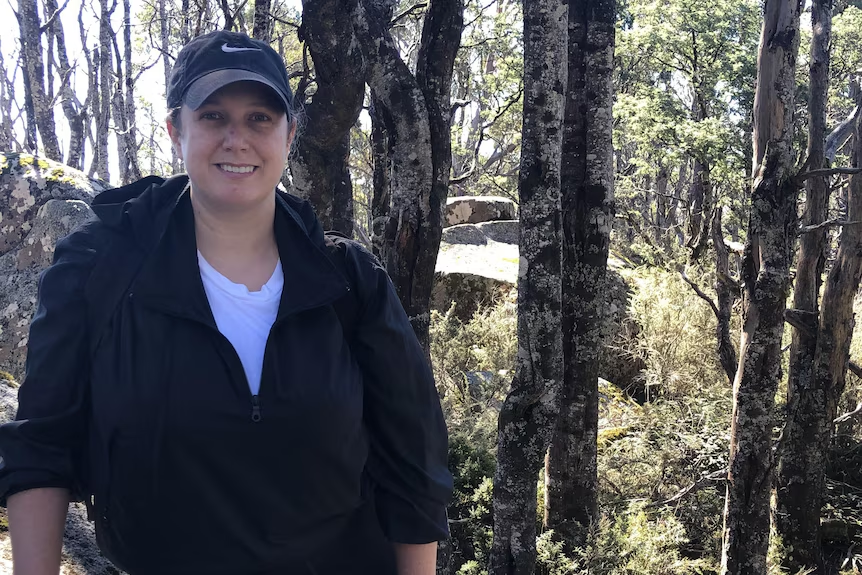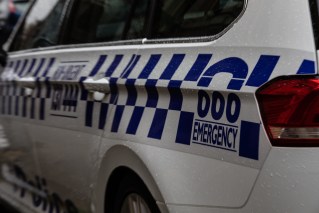Victorian Coalition pledges ‘terrorism restriction orders’ for Melbourne CBD
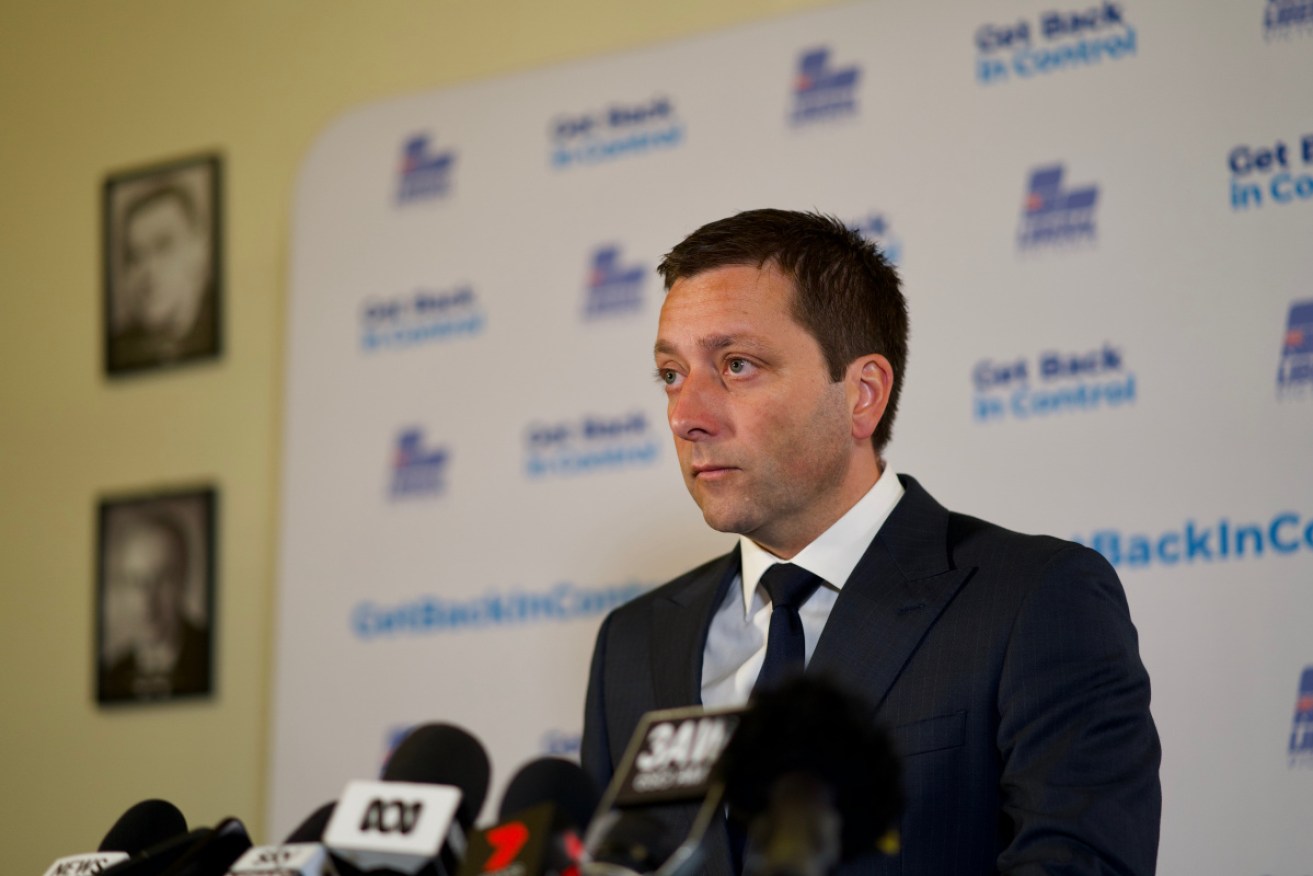
Opposition Leader Matthew Guy said he would fast-track the counter terrorism measures if elected. Photo: AAP
Victorians deemed as possible terror threats could be banned from areas like Melbourne’s CBD or forced to wear electronic monitoring devices under a plan the state opposition is promising to fast-track.
The election promise comes just days after Hassan Khalif Shire Ali, who was known to intelligence authorities, fatally stabbed one man and wounded two others in Melbourne’s Bourke Street.
Opposition Leader Matthew Guy has promised to give courts the power to issue “terrorism restriction orders” for individuals suspected of being radicalised but who did not meet the threshold for a preventative detention order or control order.
Speaking at Parliament House a day after Bourke Street rampage driver James Gargasoulas was found guilty of murdering six pedestrians last year, Mr Guy also pledged to increase the police presence in the CBD by adding eight extra patrol teams of four officers each.
“I think we can all see from the tragic events of last Friday, how seconds mattered, how every second counted,” he said.
“The safety of every person in this state will be the primary objective and goal of any government that I lead.”
Mr Guy also promised to train 100 existing police officers in advanced counterterrorism operations and measures, and hire 50 extra analyst and surveillance staff for the Victorian Fixated Threat Assessment Centre and Counter Terrorism Command.
The Coalition says the measures will cost $89.5 million.
The Coalition would also introduce legislation for the “terrorism restriction orders” by Christmas.
Under the plan, Victoria Police would apply to a magistrates’ court or children’s court to have an order imposed.

One person was killed in the Bourke Street attack last Friday. Photo: AAP
The cancellation of a person’s passport for a terrorism-related reason would create a presumption in favour of an order being required.
The man responsible for Friday’s Bourke Street attack had his passport cancelled in 2015 over fears he planned to travel to Syria.
As part of such an order, the court could require a person to:
- reside at a specific address
- abide by a curfew
- regularly report to law enforcement agencies
- wear an electronic monitoring device
- attend counselling, de-radicalisation programs or drug and alcohol rehabilitation
- stay away from certain areas, such as the Melbourne CBD
- not use their mobile phones and internet services, or other people’s communication devices
- not communicate with other persons of interest
The Coalition’s counterterrorism spokesman Robert Clark said the proposed laws would overcome a gap in the law.
“This needs to apply when a person is radicalised towards violence,” he said.
“Having views that some might consider radical or extreme is not enough – there needs to be evidence a person is being radicalised towards violence and that would be the threshold.”
Mr Guy said the creation of such orders was a key recommendation of a review of Victoria’s terrorism laws, which was commissioned by the Andrews government in June last year in the wake of a siege in the Melbourne suburb of Brighton.
In that siege, a gunman took a woman hostage, killed a man and injured three police officers before being shot dead by police.
The review, led by former Victorian Court of Appeal Justice David Harper and former police chief commissioner Ken Lay, recommended the creation of “support and engagement” orders that would enable courts to impose a “support and engagement plan”.
It said that plan could include participation in counselling, family group conferencing and support and disengagement programs.
But the review panel expressed concern that listing in legislation the conditions that could be imposed could “detract from the overall welfare focus” of such orders, particularly if conditions were included that could appear “harsh or onerous”.
In November last year, the Andrews government said it accepted in principle all 26 of the recommendations in the review’s second report.
Asked about the Coalition’s announcement while campaigning in Ballarat today, Premier Daniel Andrews pointed to Labor’s record in office.
“There was no Counter Terrorism Command when I was sworn in as premier.
“It is now a very significant part of Victoria Police’s work, and it needs to be,” Mr Andrews said.
“I’ve been criticised for some of the law reform that we’ve made, which has been described by some as going a bit too far.
“I take a view that the civil liberties of a very small number of people do not outweigh the need to keep the broader community safe.”
Victoria Police Assistant Commissioner Ross Guenther was asked on ABC Radio Melbourne on Wednesday whether politicians were generating “spin” by giving the impression that they could guarantee safety from terrorist attacks by introducing new measures or legislation.
“I think their intent is to make best endeavours to do whatever they can,” he said.
“Irrespective of which government, state or federal government, they both have an interest in obviously making Victorians and Australians safe and I think we’re a big part of that process.”
He said the continued rollout of permanent bollards throughout the CBD to reduce the risk of pedestrian attacks was one measure being taken, but said it was “a difficult thing to guarantee [safety] 100 per cent”.
“What we can do is put in practices that gives the best opportunity to do that … I’d love to say you could make it impossible, but as you can imagine that’s just not possible, literally,” Assistant Commissioner Guenther said.
In addition to the bollards, he said police were adopting a New York Police Department program where officers shared information and advice with CBD stakeholders to reduce the risk of terrorism attacks at crowded events.
More resources needed for prevention: expert
Deakin University counter terrorism expert Greg Barton said the Harper-Lay review’s recommendations were “sensible” and had bipartisan support, but authorities should be careful not to be “overzealous” in their application of tighter monitoring.
“You don’t want to go slapping an ankle bracelet on somebody at the slightest suspicion because that’s counterproductive.
“It takes a lot of resources but also you end up making young people angry, making communities suspicious, and you get a perverse outcome,” Professor Barton said.
“We shouldn’t lose track of the fact that if we need more resourcing in any space, it’s the prevention space and that means working with community, and it basically means including other things [such as] youth workers.
“If we think that there’s some silver bullet out there that’s going to solve this by legislating then we’re deluding ourselves,” he said.

